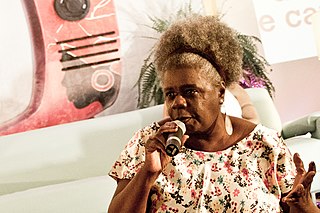
Belo Horizonte is the sixth-largest city in Brazil, with a population of around 2.3 million, and the third largest metropolitan area, with a population of 6 million. It is the 13th-largest city in South America and the 18th-largest in the Americas. The metropolis is anchor to the Belo Horizonte metropolitan area, ranked as the third most populous metropolitan area in Brazil and the 17th most populous in the Americas. Belo Horizonte is the capital of the state of Minas Gerais, Brazil's second-most populous state. It is the first planned modern city in Brazil.

The Federal University of Minas Gerais is a federal research university located in the state of Minas Gerais. Its main and biggest campus is located in the city of Belo Horizonte, Brazil. It is one of Brazil's five largest and highest-ranked universities, being the largest federal university. It offers 79 undergraduate education programs, upon completion of their curricular schedule the student is awarded either a bachelor's degree, a licenciate degree, or a professional title, all officialized by the issue of a university diploma. It also has 90 postgraduate education programs, awarding 30 postbaccalaureate specialization degrees, 92 master's degrees, and 72 doctoral degrees, as well as 41 medical residency programs offered at UFMG's hospital facilities complexes.

Saul Alves Martins was a Brazilian anthropologist and folklorist, professor of Federal University of Minas Gerais (UFMG). Formed in Social Sciences, master and doctor in the area and for years devoted himself to the study and teaching of anthropology, with an emphasis on folklore and the tradition of Minas Gerais.

Lélia Gonzalez was a Brazilian intellectual, politician, professor, anthropologist and a woman human rights defender.

Matilde Ribeiro is a Brazilian social worker and political activist. She was Chief Minister of the SEPPIR in the Lula government.

In 2015 and 2016, a series of protests in Brazil denounced corruption and the government of President Dilma Rousseff, triggered by revelations that numerous politicians allegedly accepted bribes connected to contracts at state-owned energy company Petrobras between 2003 and 2010 and connected to the Workers' Party, while Rousseff chaired the company's board of directors. The first protests on 15 March 2015 numbered between one and nearly three million protesters against the scandal and the country's poor economic situation. In response, the government introduced anti-corruption legislation. A second day of major protesting occurred 12 April, with turnout, according to GloboNews, ranging from 696,000 to 1,500,000. On 16 August, protests took place in 200 cities in all 26 states of Brazil. Following allegations that Rousseff's predecessor, Luiz Inácio Lula da Silva, participated in money laundering and a prosecutor ordered his arrest, record numbers of Brazilians protested against the Rousseff government on 13 March 2016, with nearly 7 million citizens demonstrating.

Jessé José Freire de Souza or simply Jessé Souza is a Brazilian professor and researcher.

Luiza Helena de Bairros was a Brazilian administrator and sociologist. She was the chief minister of the Special Secretariat for Policies to Promote Racial Equality between 2011 and 2014.
Afro-Brazilian feminism is a social movement that seeks to address systemic violence and discrimination against Afro-Brazilian women. Afro-Brazilian women created their feminism in order to mitigate the lack of space and representation given to them in mainstream/white feminism in Brazil. Overall, Afro-Brazilian feminism addresses the intersectionality between racism, sexism, and classism, due to the social and economic exclusion of Afro-Brazilian women in Brazil.

Maria da Conceição Evaristo de Brito is a Brazilian writer. Her work is marked by her life experiences as an Afro-Brazilian woman, which she calls escrevivência—a portmanteau of escrita (writing) and vivência. She was born into a humble family and is the second oldest of 9 siblings, being the first in her household to earn a university degree. She helped her mother and aunt with washing clothes and deliveries, while studying.
Júnia Ferreira Furtado is a Brazilian historian and university professor. She retired from the Universidade Federal de Minas Gerais (UFMG) in 2016.

Patrus Ananias de Sousa is a Brazilian lawyer and politician, member of the Workers' Party (PT). He was Minister of Agrarian Development during the second term of president Dilma Rousseff.

Aparecida Sueli Carneiro Jacoel, best known as Sueli Carneiro is a Brazilian philosopher, writer and anti-racism activist. Carneiro is the founder and current director of Geledés — Instituto da Mulher Negra and a leading author on black feminism in Brazil.
Geledés - Black Women's Institute is a Brazilian political organization of black women against racism and sexism. It is a civil society organization founded on April 30, 1988. Geledés main goal is to eradicate the discrimination present in society that affects black subjects, without discouraging the fight against all other forms of discrimination, such as homophobia, regional, creed, opinion and social class prejudices. Its name derives from the concept of gelede, female secret societies in Yoruba culture.

Solano Trindade was a Brazilian poet, actor, folklorist, painter, stage director and activist. Trindade was active in the Brazilian Black Movement, having founded or co-founded several popular theater and art initiatives, such as the Teatro Popular Brasileiro company.

Leonardo Péricles Vieira Roque, also known as Leo Péricles, is a Brazilian politician. He is the president and founder of the Popular Unity (UP).

Maria Josefina de Vasconcellos, often referred to as Jô Vasconcellos, is a Brazilian architect, urban planner, and landscape designer. She has designed several important buildings and complexes in the city of Belo Horizonte, including the Centro de Cultura Presidente Itamar Franco and the Rainha da Sucata Building
Isabella Gonçalves Miranda, better known as Bella Gonçalves, is a Brazilian political scientist and politician. She served as a city councilor in Belo Horizonte representing the Socialism and Liberty Party (PSOL). Isabella also held the position of president of the city section of PSOL and was an active member of the Brigadas Populares, advocating for the right to the city. Notably, she became the first openly lesbian city councilor in Belo Horizonte. She was elected as a State Representative of Minas Gerais in 2022.
Zélia Amador de Deus is a Brazilian university professor emerita, activist for the rights of the black population, an advocate for affirmative action in higher education, an actress and theatre director. She was one of the founders of the "Centre for Studies and Defence of Black People" in the Brazilian state of Pará.
Kabengele Munanga is a Brazilian-Congolese anthropologist and professor. He is a specialist on the anthropology of Afro-Brazilians, researching the issue of racism in Brazilian society. He is a graduate of the University of Lubumbashi (1969) and graduated with a doctorate in anthropology from University of São Paulo (1977).














